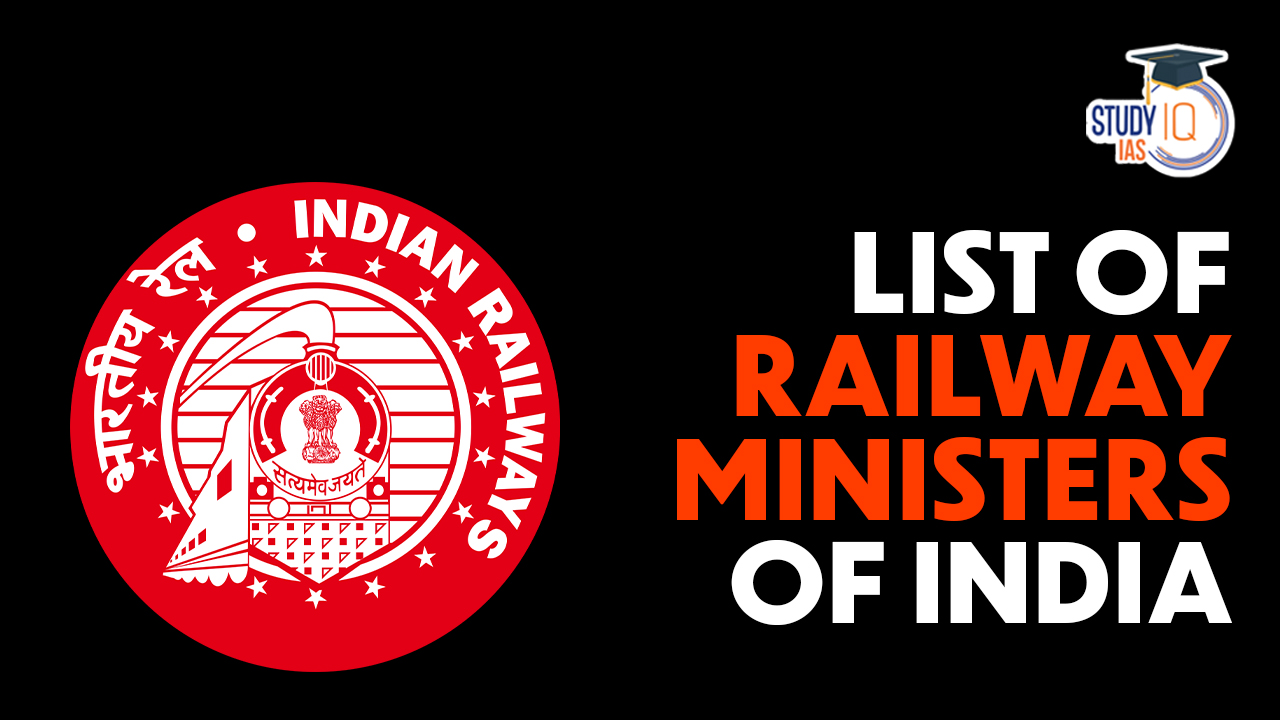Table of Contents
The Railway Minister of India is crucial in managing the Ministry of Railways, which oversees the country’s extensive railway system. Various notable individuals have held this position since India gained independence. Understanding the history of Railway Ministers, including their tenures and political affiliations, is essential for general awareness, particularly for competitive exams.
List of Railway Ministers of India
Indian Railways is a vital part of the country’s infrastructure, operating approximately 14,300 trains across 7,349 stations and covering a network length of 68,103 kilometers. It is one of the largest railway networks in the world, serving around 22.7 million passengers daily. The Railway Minister of India is a pivotal role within the Ministry of Railways, overseeing the country’s vast railway network. This position has been held by many influential leaders since the country’s independence. As of 2024, Ashwini Vaishnaw serves as the current Railway Minister, having assumed office in July 2021.
Current Railway Minister of India
Shri Ashwini Vaishnaw is currently serving as the 40th Union Minister of Railways of India, having taken office on July 7, 2021. He is a former IAS officer and has held significant positions in both the public and private sectors, including:
- Deputy Secretary, Prime Minister’s Office (2003-2004)
- Managing Director – GE Transportation
- Vice President – Siemens
Previous Positions
- Communications Minister
- Electronics & Information Technology Minister
As a member of the Rajya Sabha, he represents the state of Odisha and has played a key role in shaping India’s railway infrastructure and policies.
List of Railway Ministers of India From 1947 to 2024
Check here the List of Railway Ministers of India From 1947 to 2023 in detail along with their tenure, associated political party and also about the person.
| S.No | Name | Term | Prime Minister | Political Party | About the Person |
| 1 | John Mathai | 15 Aug 1947 – 22 Sep 1948 | Jawaharlal Nehru | Indian National Congress | An economist and educationist, John Mathai was the first Railway Minister of independent India. He played a key role in establishing the Indian Railways on the path of progress and development. |
| 2 | N. Gopalaswami Ayyangar | 22 Sep 1948 – 13 May 1952 | Jawaharlal Nehru | Indian National Congress | A lawyer and freedom fighter, N. Gopalaswami Ayyangar made significant contributions to the growth of the Indian Railways and its modernization during his tenure as the Railway Minister. |
| 3 | Lal Bahadur Shastri | 13 May 1952 – 7 Dec 1956 | Jawaharlal Nehru | Indian National Congress | A prominent leader of the Indian independence movement, Lal Bahadur Shastri’s tenure as the Railway Minister saw various reforms and initiatives to improve railway services and infrastructure. |
| 4 | Jagjivan Ram | 7 Dec 1956 – 10 Apr 1962 | Jawaharlal Nehru | Indian National Congress | Jagjivan Ram, a prominent Dalit leader, played a crucial role in modernizing Indian Railways and improving working conditions for railway employees during his tenure as the Railway Minister. |
| 5 | Swaran Singh | 10 Apr 1962 – 21 Sep 1963 | Jawaharlal Nehru | Indian National Congress | Swaran Singh, a seasoned politician and diplomat, contributed to the development of railway infrastructure and international cooperation in the railway sector during his brief term as the Railway Minister. |
| 6 | H. C. Dasappa | 21 Sep 1963 – 8 Jun 1964 | Jawaharlal Nehru | Indian National Congress | H. C. Dasappa, an Indian National Congress leader, served as the Railway Minister for a short period, focusing on implementing various projects to improve railway services and connectivity. |
| 7 | S. K. Patil | 9 Jun 1964 – 12 Mar 1967 | Lal Bahadur Shastri | Indian National Congress | S. K. Patil, a veteran politician, took significant steps towards modernizing the Indian Railways and ensuring better facilities for passengers during his tenure as the Railway Minister. |
| 8 | C. M. Poonacha | 13 Mar 1967 – 14 Feb 1969 | Indira Gandhi | Indian National Congress | C. M. Poonacha, an agriculturist and politician, contributed to the expansion of the Indian Railways and the introduction of new initiatives during his term as the Railway Minister. |
| 9 | Ram Subhag Singh | 14 Feb 1969 – 4 Nov 1969 | Indira Gandhi | Indian National Congress | Ram Subhag Singh, an Indian National Congress leader, focused on improving passenger amenities and safety measures in the Indian Railways during his tenure as the Railway Minister. |
| 10 | Panampilly Govinda Menon | 4 Nov 1969 – 18 Feb 1970 | Indira Gandhi | Indian National Congress | Panampilly Govinda Menon served as the Railway Minister for a short period, focusing on improving railway connectivity and freight transportation in India. |
| 11 | Gulzarilal Nanda | 18 Feb 1970 – 17 Mar 1971 | Indira Gandhi | Indian National Congress | Gulzarilal Nanda, a prominent politician and economist, took various measures to improve railway infrastructure and operations during his tenure as the Railway Minister. |
| 12 | K. Hanumanthaiah | 18 Mar 1971 – 22 Jul 1972 | Indira Gandhi | Indian National Congress | K. Hanumanthaiah, a lawyer and politician, contributed to the development of the Indian Railways and the implementation of passenger-friendly policies during his term as the Railway Minister. |
| 13 | T. A. Pai | 23 Jul 1972 – 4 Feb 1973 | Indira Gandhi | Indian National Congress | T. A. Pai, a prominent educationist and administrator, worked towards improving passenger amenities and expanding railway connectivity during his tenure as the Railway Minister. |
| 14 | Lalit Narayan Mishra | 5 Feb 1973 – 2 Jan 1975 | Indira Gandhi | Indian National Congress | Lalit Narayan Mishra, a seasoned politician, played a vital role in the development and expansion of the Indian Railways during his term as the Railway Minister. |
| 15 | Kamalapati Tripathi | 11 Feb 1975 – 23 Mar 1977 | Indira Gandhi | Indian National Congress | Kamalapati Tripathi, a veteran politician, focused on improving railway infrastructure and implementing policies for the welfare of railway employees during his tenure as the Railway Minister. |
| 16 | Madhu Dandavate | 26 Mar 1977 – 28 Jul 1979 | Morarji Desai | Janata Party | Madhu Dandavate, a prominent socialist leader, played a key role in streamlining railway operations and ensuring transparency in the functioning of the Indian Railways during his term as the Railway Minister. |
| 17 | T. A. Pai | 30 Jul 1979 – 14 Jan 1980 | Charan Singh | Janata Party (Secular) | T. A. Pai served as the Railway Minister for a brief period, focusing on improving passenger facilities and safety measures in the Indian Railways. |
| 18 | Kamalapati Tripathi | 14 Jan 1980 – 12 Nov 1980 | Indira Gandhi | Indian National Congress | Kamalapati Tripathi, in his second term as the Railway Minister, continued his efforts to improve railway infrastructure and services during his tenure. |
| 19 | Kedar Pandey | 12 Nov 1980 – 14 Jan 1982 | Indira Gandhi | Indian National Congress | Kedar Pandey, an Indian National Congress leader, worked towards the expansion and modernization of the Indian Railways and enhancing passenger amenities during his tenure as the Railway Minister. |
| 20 | Prakash Chandra Sethi | 15 Jan 1982 – 2 Sep 1982 | Indira Gandhi | Indian National Congress | Prakash Chandra Sethi, a seasoned bureaucrat, played a key role in implementing various projects for railway development and modernization during his term as the Railway Minister. |
| 21 | A. B. A. Ghani Khan Choudhury | 2 Sep 1982 – 31 Dec 1984 | Indira Gandhi | Indian National Congress | A. B. A. Ghani Khan Choudhury, a prominent leader from West Bengal, focused on improving railway services and connectivity in eastern India during his tenure as the Railway Minister. |
| 22 | Bansi Lal | 31 Dec 1984 – 24 Jun 1986 | Rajiv Gandhi | Indian National Congress | Bansi Lal, a seasoned politician and former Chief Minister of Haryana, worked on various projects to enhance railway connectivity and infrastructure during his term as the Railway Minister. |
| 23 | Mohsina Kidwai | 24 Jun 1986 – 21 Oct 1986 | Rajiv Gandhi | Indian National Congress | Mohsina Kidwai, a prominent politician and social worker, focused on improving passenger amenities and safety measures during her brief tenure as the Railway Minister. |
| 24 | Madhavrao Scindia | 22 Oct 1986 – 2 Dec 1989 | Rajiv Gandhi | Indian National Congress | Madhavrao Scindia, a dynamic leader and sports enthusiast, played a significant role in the modernization and expansion of the Indian Railways during his term as the Railway Minister. |
| 25 | George Fernandes | 2 Dec 1989 – 10 Nov 1990 | V. P. Singh | Janata Dal | George Fernandes, a prominent socialist leader, focused on improving railway services and facilities during his tenure as the Railway Minister. |
| 26 | Janeshwar Mishra | 21 Nov 1990 – 21 Jun 1991 | Chandra Shekhar | Samajwadi Janata Party (Rashtriya) | Janeshwar Mishra, a senior politician and socialist leader, contributed to the development and expansion of the Indian Railways during his term as the Railway Minister. |
| 27 | C. K. Jaffer Sharief | 21 Jun 1991 – 17 Oct 1995 | P. V. Narasimha Rao | Indian National Congress | C. K. Jaffer Sharief, an engineer and seasoned politician, played a key role in modernizing railway infrastructure and implementing passenger-friendly initiatives during his tenure as the Railway Minister. |
| 28 | Ram Vilas Paswan | 1 Jun 1996 – 19 Mar 1998 | H. D. Deve Gowda, I. K. Gujral | Janata Dal (United Front) | Ram Vilas Paswan, a prominent leader from Bihar, worked towards improving passenger amenities and connectivity during his tenure as the Railway Minister. |
| 29 | Nitish Kumar | 19 Mar 1998 – 5 Aug 1999 | Atal Bihari Vajpayee | Samata Party | Nitish Kumar, a prominent leader from Bihar, contributed to the development of railway infrastructure and safety measures during his term as the Railway Minister. |
| 30 | Ram Naik | 6 Aug 1999 – 13 Oct 1999 | Atal Bihari Vajpayee | Bharatiya Janata Party | Ram Naik, a seasoned politician, focused on implementing various projects to enhance railway connectivity and services during his brief tenure as the Railway Minister. |
| 31 | Mamata Banerjee | 13 Oct 1999 – 15 Mar 2001 | Atal Bihari Vajpayee | All India Trinamool Congress | Mamata Banerjee, a prominent leader from West Bengal, played a crucial role in the development and expansion of the Indian Railways during her tenure as the Railway Minister. |
| 32 | Nitish Kumar | 20 Mar 2001 – 22 May 2004 | Atal Bihari Vajpayee | Janata Dal (United) | Nitish Kumar, in his second term as the Railway Minister, continued his efforts to enhance railway connectivity and services during his tenure. |
| 33 | Lalu Prasad Yadav | 22 May 2004 – 22 May 2009 | Manmohan Singh | Rashtriya Janata Dal | Lalu Prasad Yadav, a prominent leader from Bihar, brought significant reforms and modernization to the Indian Railways during his tenure as the Railway Minister. |
| 34 | Mamata Banerjee | 22 May 2009 – 19 May 2011 | Manmohan Singh | All India Trinamool Congress | Mamata Banerjee, in her second term as the Railway Minister, continued her focus on railway development and passenger-centric services during her tenure. |
| 35 | Dinesh Trivedi | 12 Jul 2011 – 19 Mar 2012 | Manmohan Singh | Indian National Congress | Dinesh Trivedi, a seasoned politician, worked towards implementing various railway projects and improving passenger amenities during his tenure as the Railway Minister. |
| 36 | Mukul Roy | 20 Mar 2012 – 22 Sep 2012 | Manmohan Singh | All India Trinamool Congress | Mukul Roy, a leader from West Bengal, focused on enhancing railway connectivity and facilities during his brief term as the Railway Minister. |
| 37 | C. P. Joshi | 22 Sep 2012 – 28 Oct 2012 | Manmohan Singh | Indian National Congress | C. P. Joshi, a seasoned politician, contributed to the development of railway infrastructure and services during his brief tenure as the Railway Minister. |
| 38 | Pawan Kumar Bansal | 29 Oct 2012 – 10 May 2013 | Manmohan Singh | Indian National Congress | Pawan Kumar Bansal, an experienced politician, worked towards modernizing railway infrastructure and enhancing passenger facilities during his tenure as the Railway Minister. |
| 39 | C. P. Joshi | 13 May 2013 – 14 Jun 2013 | Manmohan Singh | Indian National Congress | C. P. Joshi, in his second term as the Railway Minister, continued his efforts to improve railway services and amenities during his brief tenure. |
| 40 | Mallikarjun Kharge | 17 Jun 2013 – 26 May 2014 | Manmohan Singh | Indian National Congress | Mallikarjun Kharge, an experienced politician, focused on railway development and welfare measures for railway employees during his tenure as the Railway Minister. |
| 41 | D. V. Sadananda Gowda | 26 May 2014 – 9 Nov 2014 | Narendra Modi | Bharatiya Janata Party | D. V. Sadananda Gowda, a leader from Karnataka, initiated various projects and policies to improve railway connectivity and services during his term as the Railway Minister. |
| 42 | Suresh Prabhu | 9 Nov 2014 – 3 Sep 2017 | Narendra Modi | Bharatiya Janata Party | Suresh Prabhu, a seasoned politician, played a key role in modernizing railway infrastructure and introducing passenger-friendly initiatives as the Railway Minister. |
| 43 | Piyush Goyal | 3 Sep 2017 – 7 Jul 2021 | Narendra Modi | Bharatiya Janata Party | Piyush Goyal, a seasoned leader, contributed to significant reforms and advancements in the Indian Railways during his tenure as the Railway Minister. |
| 44 | Ashwini Vaishnaw | 7 Jul 2021 – Present | Narendra Modi | Bharatiya Janata Party | Ashwini Vaishnaw, an experienced bureaucrat and politician, has been working towards further development and modernization of the Indian Railways during his tenure as the Railway Minister. |
First Railway Minister of India
Dr. John Mathai was the first Railway Minister of India, serving from August 15, 1947, to September 22, 1948. A distinguished economist and politician, he represented the Indian National Congress party. Dr. Mathai is renowned for his contributions to economic policy and received the Padma Vibhushan award for his research on Persian and Arabian languages.
First Female Railway Minister of India
Smt. Mamata Banerjee was the first female Railway Minister of India, serving from 1999 to 2001 and again from 2009 to 2011. She made history by becoming the first woman to present the Railway Budget in Parliament in 2002. A prominent leader of the All India Trinamool Congress, she is currently the Chief Minister of West Bengal. Her tenure marked a significant milestone in Indian political history.
Roles and Responsibilities of Railway Minister of India
The Railway Minister of India has several crucial responsibilities, including:
- Development and Implementation: Formulating and executing plans related to the railway sector.
- Railway Budget: Presenting the railway budget in Parliament annually, detailing financial allocations and improvement plans.
- Infrastructure Projects: Overseeing the planning and execution of railway infrastructure projects, including the construction of new lines and stations.
- Passenger Safety: Ensuring the safety of passengers and protection of railway assets.
- Technological Upgradation: Incorporating modern technologies to enhance operational efficiency.
- Station Facilities: Improving station facilities to boost passenger satisfaction.
- Employee Welfare: Addressing the concerns of railway employees to promote their welfare.
- Financial Management: Handling funds, managing costs, and ensuring the financial sustainability of Indian Railways.


 World Intellectual Property Day 2025, Th...
World Intellectual Property Day 2025, Th...
 World Malaria Day 2025: Date, Theme, His...
World Malaria Day 2025: Date, Theme, His...
 World Immunization Week (24 to 30 April)...
World Immunization Week (24 to 30 April)...





















